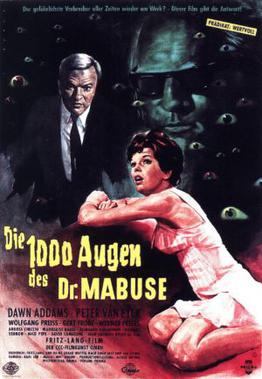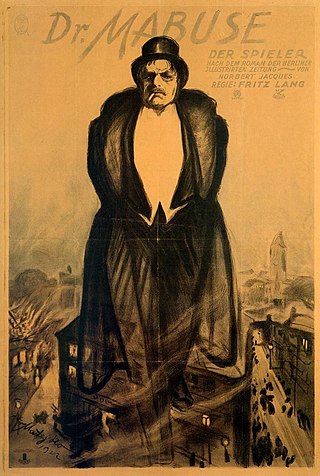Related Research Articles

Friedrich Christian Anton Lang, better known as Fritz Lang, was an Austrian-American film director, screenwriter, and producer who worked in Germany and later the United States. One of the best-known émigrés from Germany's school of Expressionism, he was dubbed the "Master of Darkness" by the British Film Institute. He has been cited as one of the most influential filmmakers of all time.

Dr. Mabuse is a fictional character created by Norbert Jacques in his 1921 novel Dr. Mabuse, der Spieler, and his 1932 follow-up novel Das Testament des Dr. Mabuse (1932). The character was made famous by three films about the character directed in Germany by Fritz Lang: Dr. Mabuse the Gambler, The Testament of Dr. Mabuse (1933), and the much later The Thousand Eyes of Dr. Mabuse (1960). Five other films featuring Dr. Mabuse were made by other directors in Germany in the early 1960s, followed by Jess Franco's interpretation The Vengeance of Dr. Mabuse in 1971.

The Testament of Dr. Mabuse, also called The Last Will of Dr. Mabuse, is a 1933 German crime-thriller film directed by Fritz Lang. The movie is a sequel to Lang's silent film Dr. Mabuse the Gambler (1922) and features many cast and crew members from Lang's previous films. Dr. Mabuse is in an insane asylum where he is found frantically writing his crime plans. When Mabuse's criminal plans begin to be implemented, Inspector Lohmann tries to find the solution with clues from gangster Thomas Kent, the institutionalized Hofmeister and Professor Baum who becomes obsessed with Dr. Mabuse.
Wolfgang Preiss was a German theatre, film and television actor.

Harald Reinl was an Austrian film director. He is known for the films he made based on Edgar Wallace and Karl May books and also made mountain films, Heimatfilms, German war films and entries in such popular German film series as Dr. Mabuse, Jerry Cotton and Kommissar X. His directing output includes more than 60 titles. With his Edgar Wallace and Karl May adaptations, Reinl advanced to become one of the most successful directors in German cinema in the 1960s: with the four Karl May films he made between 1962 and 1965 alone, Reinl reached 32 million viewers.

Emile Ardolino was an American television and film director and producer, best known for his work on the films Dirty Dancing (1987) and Sister Act (1992). He won an Academy Award for Best Documentary Feature for his film He Makes Me Feel Like Dancin' (1983).

The Thousand Eyes of Dr. Mabuse is a 1960 black-and-white crime thriller film directed by Fritz Lang in his final film. A West German/French/Italian international co-production, it starred Peter van Eyck, Dawn Addams and Gert Fröbe. The film made use of the character Dr. Mabuse, who had appeared in earlier films by Lang in 1922 and 1933. The Thousand Eyes of Dr. Mabuse spawned a film series of German Mabuse films that were released over the following years to compete with Rialto Film's Krimi films.

Dr. Mabuse the Gambler is the first film in the Dr. Mabuse series about the character Doctor Mabuse who featured in the novels of Norbert Jacques. It was directed by Fritz Lang and released in 1922. The film is silent and would be followed by the sound sequels The Testament of Dr. Mabuse (1933) and The Thousand Eyes of Dr. Mabuse (1960).

The Australian Film Commission (AFC) was an Australian government agency was founded in 1975 with a mandate to promote the creation and distribution of films in Australia as well as to preserve the country's film history. It also had a production arm responsible for production and commissioning of films for the government. It was superseded by Screen Australia from 1 July 2008.
Russell Reginald Brice is a New Zealand mountaineer. He was the owner/manager of Himex, a climbing expedition company. He has summited Cho Oyu seven times, Himal Chuli and Mount Everest twice, as well as Manaslu in October 2010, which was his 14th summit of an 8000 m peak.
CTC is a television station in Canberra, Australia. The station was the tenth to begin transmission in regional Australia, and the 26th station in Australia as a whole. CTC has an affiliation agreement to show content from Network 10. Just as it has had a number of owners, CTC has also had many different identities on-air – including CTC-TV, Super 7, Capital 7, 10 TV Australia, Capital Television, Ten Capital, Southern Cross Ten, Channel 9 and Channel 10. The station is owned and operated by Southern Cross Austereo through Australian Capital Television Pty Ltd, as one of SCA's 10 stations.

Scotland Yard Hunts Dr. Mabuse or Scotland Yard vs. Dr Mabuse is a 1963 German crime film directed by Paul May and starring Peter van Eyck. Scotland Yard vs. Dr. Mabuse was distributed in West Germany by Gloria Film, premiering on 20 September 1963. The film was written by Ladislas Fodor, based on a story idea written by Bryan Edgar Wallace. It was shot at the Spandau Studios in Berlin. The film's sets were designed by the art directors Albrecht Hennings and Hans Kuhnert.

Norbert Jacques was a Luxembourgish novelist, journalist, screenwriter, and translator who wrote in German. He was born in Luxembourg-Eich, Luxembourg and died in Koblenz, West Germany. He created the character Dr. Mabuse, who was a feature of some of his novels. Dr. Mabuse, der Spieler, the first novel to feature Mabuse, was one of the bestsellers of its time; it sold over 500,000 copies in Germany. Today, Jacques is known best for Dr. Mabuse. In 1922, he received German citizenship.

Walter Rilla was a German film actor of Jewish descent. He appeared in more than 130 films between 1922 and 1977. He was born in Neunkirchen, Germany and died in Rosenheim, Germany.

Dr. M. is a 1990 crime film co-written and directed by Claude Chabrol. The film is loosely based on the plot of Fritz Lang's Dr. Mabuse the Gambler, which was in turn based on Mabuse der Spieler by Norbert Jacques.

Andrew Pike is an Australian film historian, film distributor and exhibitor, and documentary producer and director. Pike formed Ronin Films, an Australian film distribution company, with his first wife, Dr Merrilyn Fitzpatrick, in 1974. With Ross Cooper, he co-authored the book, Reference Guide to Australian Films 1906–1969 and has produced and directed many documentaries since 1982. Pike has been honoured with numerous awards including a plaque on the ACT Honour Walk in Canberra City, appointed of the Order of Australia (OAM) and an Honorary Doctorate from the University of Canberra.

The Return of Doctor Mabuse is a 1961 black-and-white crime film/thriller made in West Berlin. It was a West German/French/Italian international co-production directed by Harald Reinl that was the second of the 1960s CCC Films Dr. Mabuse film series, being the sequel to Fritz Lang's The Thousand Eyes of Dr. Mabuse (1960). It starred Gert Fröbe, Daliah Lavi and in his first German film, Lex Barker. The film was co-written by Ladislas Fodor and, in his first screenplay, Marc Behm. They created a science fictional plot that would be followed in the other films in the series.

Otlile "Oti" Mabuse is a South African talent show judge, presenter, dancer and Latin dance champion currently based in the United Kingdom. She is best known for being a professional dancer on the British television series Strictly Come Dancing, which she won in 2019 and 2020, and its German equivalent, Let's Dance. She was a Dance Captain on The Greatest Dancer. Since 2021, she has been a panellist on The Masked Dancer and became a judge on Dancing on Ice in 2022.
The 36th Australian Film Institute Awards were held in 1994. Presented by the Australian Film Institute (AFI), the awards celebrated the best in Australian feature film, television, documentary and short film productions of the year.
References
- ↑ Warden, Ian (26 November 1990), "A warbling passion for silent films", The Canberra Times
- ↑ Barnes, Frank (31 July 2000), "Bill board", Tribune
- ↑ Anderson, Doug (19 November 1990), "Lang conquers all", The Sydney Morning Herald
- ↑ "In Search of Dr Mabuse", The Canberra Times, 19 November 1990